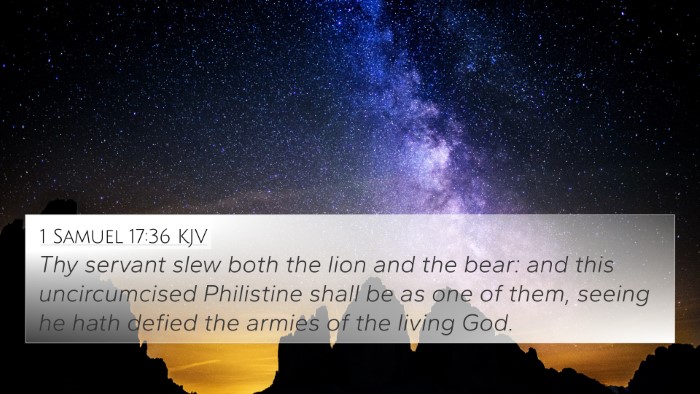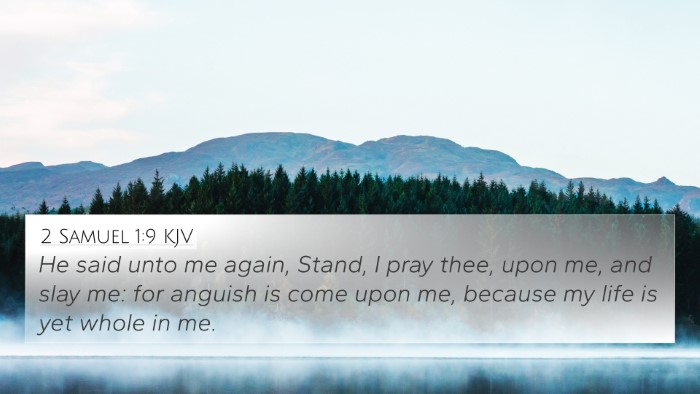Understanding 1 Samuel 31:4
Verse Text: "Then Saul said to his armor-bearer, 'Draw your sword and thrust me through with it, lest these uncircumcised come and abuse me.' But his armor-bearer would not, for he was greatly afraid. Therefore Saul took a sword and fell on it."
Summary of Meaning
1 Samuel 31:4 captures a moment of tragic despair as King Saul faces defeat in battle against the Philistines. This verse illustrates themes of mortality, the burden of leadership, and the agony of an individual who has lost favor with both God and his people. Throughout public domain commentaries, such as those by Matthew Henry, Albert Barnes, and Adam Clarke, this verse is explored for its emotional depth and its reflection on the consequences of turning away from God.
Insights from Commentaries
-
Matthew Henry:
Henry emphasizes Saul's mental state, highlighting that despair can lead a person to contemplate unthinkable actions. Saul, feeling abandoned by God and fearing humiliation at the hands of the enemy, represents a leader who has fallen from grace.
-
Albert Barnes:
Barnes points out that Saul's request for his armor-bearer to kill him illustrates the intense fear and shame he experiences, showing how pride can lead to tragic decisions. The refusal of the armor-bearer signifies loyalty and the respect for life, even in times of great despair.
-
Adam Clarke:
Clarke discusses the historical context, noting that this moment culminates Saul’s tragic arc as a king. The act of falling on his own sword signifies not just a physical death but a symbolic end to his reign and aspirations.
Thematic Connections
This verse can be linked thematically to various other scriptures that address despair, the consequences of sin, and the nature of true leadership. Here are some significant cross-references:
-
1 Chronicles 10:4:
This parallel account emphasizes Saul's death and the reasons behind it, providing context to the events of 1 Samuel 31:4.
-
2 Samuel 1:10:
In this verse, an Amalekite claims to have killed Saul, offering a stark contrast to Saul's own end while reinforcing the consequences of his earlier actions.
-
Proverbs 24:16:
This verse states that "for a just man falls seven times and rises up again," highlighting the theme of falling from grace and recovery.
-
Psalm 141:4:
David prays against turning to evil, reflecting on Saul’s misguided choices that led to his downfall.
-
Jeremiah 17:5:
This verse discusses the curse of relying on human strength rather than the Lord, which resonates with Saul's tragic reliance on his own understanding.
-
Galatians 6:7:
"For whatever a man sows, that he will also reap," connects to Saul's life decisions leading to death and destruction.
-
Luke 12:4-5:
Jesus teaches about whom to fear, emphasizing the eternal consequences that outweigh temporal concerns, similar to Saul's earthly fears.
-
Romans 6:23:
This verse about the wages of sin connects to Saul's life, culminating in a tragic end due to his disobedience to God.
-
Matthew 27:5:
This verse describes Judas's suicide, reflecting a parallel in despair leading to self-destructive choices.
Biblical Reflections
The heartbreaking narrative in 1 Samuel 31:4 serves as a sobering reminder of the importance of aligning one's life with divine purpose. As Saul's story concludes, readers are invited to reflect on their own lives and choices, pondering the true source of strength and guidance.
Cross-Referencing Tools
For those interested in exploring deeper connections within the Bible, various resources serve as tools for cross-referencing. Using a Bible concordance can vastly improve one’s ability to find relevant scriptures that discuss similar themes, historical contexts, and theological concepts.
Additionally, a Bible cross-reference guide can facilitate understanding of the inter-Biblical dialogue, aiding in the identification of connections between Old and New Testament writings. Comprehensive Bible reference resources and cross-reference Bible study methods are invaluable for sermon preparation and personal study.
Conclusion
Understanding 1 Samuel 31:4 in conjunction with its thematic connections and cross-references enriches the reader's comprehension of the choices and consequences within the biblical narrative. The interplay of despair, sin, and redemption resonates through the scriptures, providing key insights into the human condition and divine grace.
















